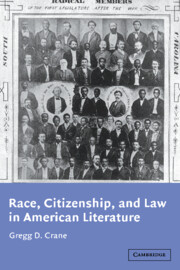Book contents
- Frontmatter
- Contents
- Acknowledgments
- Introduction
- Chapter 1 Higher law in the 1850s
- Chapter 2 The look of higher law: Harriet Beecher Stowe's antislavery fiction
- Chapter 3 Cosmopolitan constitutionalism: Emerson and Douglass
- Chapter 4 The positivist alternative
- Chapter 5 Charles Chesnutt and Moorfield Storey: citizenship and the flux of contract
- Notes
- Index
Chapter 3 - Cosmopolitan constitutionalism: Emerson and Douglass
Published online by Cambridge University Press: 22 September 2009
- Frontmatter
- Contents
- Acknowledgments
- Introduction
- Chapter 1 Higher law in the 1850s
- Chapter 2 The look of higher law: Harriet Beecher Stowe's antislavery fiction
- Chapter 3 Cosmopolitan constitutionalism: Emerson and Douglass
- Chapter 4 The positivist alternative
- Chapter 5 Charles Chesnutt and Moorfield Storey: citizenship and the flux of contract
- Notes
- Index
Summary
Ralph Waldo Emerson and Frederick Douglass both appreciated Uncle Tom's Cabin's success in reaching “the universal heart.” Yet, while sharing Stowe's higher law conviction that American law must be founded on universal ethical norms, Emerson and Douglass differed from Stowe in two important and related aspects. First, they rejected the emphasis on racial type characterizing Stowe's appeal to the nation's conscience, and, second, they resisted the absolutism of Stowe's higher law vision. Both wanted to distinguish higher law from images and conceptions limiting the possibilities of human transformation and reducing moral agency to merely obeying the certainties of divine ordinance. Higher law, for Emerson and Douglass, was a mutable human creation, an ongoing attempt to put moral inspiration into political dialogue and legal practice.
Both sought to sever the Constitution's foundational principles of conscience and consent from the prerequisite of racial and cultural resemblance. Emerson's antislavery addresses use irony to dissolve the connection between race and justice and abstraction to draw the Constitution into the process of cultural revision he describes in “Circles” and “The Poet.” Emerson's irony and abstraction, in effect, clear a constitutional space for black citizenship and moral agency – a space that, in avoiding the fixities of his own racial views, Emerson leaves empty.
- Type
- Chapter
- Information
- Race, Citizenship, and Law in American Literature , pp. 87 - 130Publisher: Cambridge University PressPrint publication year: 2002



